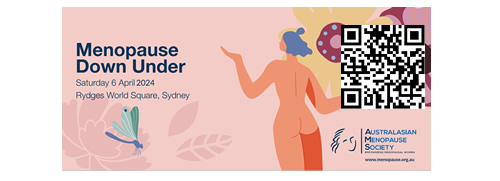Insomnia is one of the most common symptoms of menopause, with nearly 20% of postmenopausal women reporting sleep disturbances. A new study from Korea demonstrates that sleep quality is often worse for women who undergo surgical menopause compared with those who transition through menopause naturally. The study results are published online today in Menopause, the journal of The North American Menopause Society (NAMS).
Surgical menopause is often accompanied by more psychological and physical difficulties. The increased severity of menopause symptoms such as hot flashes and night sweats can disrupt sleep during a time in a woman's life when sleep problems are already an issue; however, only a few quantitative studies have investigated sleep-interfering behavior in postmenopausal women. This new study is one of the first to compare sleep-interfering behaviors based on type of menopause, surgical and natural.
More than 500 postmenopausal women completed questionnaires as part of the study. Women in the surgical menopause group reported significantly worse sleep quality, especially for sleep duration and habitual sleep efficiency, compared with women in the natural menopause group. In addition, women who underwent surgical menopause were found to be more than twice as likely to have insomnia. Furthermore, those women in the surgical menopause group who displayed more sleep-interfering behaviors had a higher severity of insomnia symptoms.
Abstract
Objective:
Women who undergo surgical menopause (SM) experience a relatively more acute and precipitous drop of estrogen comparedwith women who experience natural menopause (NM). Few studies, however, have compared sleep quality in women who experience naturalversus SM.
Methods:
Participants were 526 postmenopausal women (mean age 60.2 ± 7.64). All participants completed self-report questionnaires about insomnia symptoms, sleep-interfering behaviors, depression, sleep quality, and gynecological history. Analysis of covariance was conducted to compare women who experienced NM versus SM on sleep variables. Logistic regression analysis was used to determine whether NM or SM groups predicted insomnia status. Regression-based moderation analysis was conducted to explore the moderating effect of type of menopause on the relationship between sleep-interfering behaviors and insomnia symptoms.
Results:
Among the sample, 81.6% (n = 429) reported going through NM and 18.4% (n = 97) reported going through SM. The SM group was significantly younger by 7.2 years (P < 0.001). Women in the SM group reported significantly worse sleep quality (P = 0.007), especially for sleep duration (P = 0.001) and habitual sleep efficiency (P = 0.010) compared with women in the NM group. Regression analysis indicated that individuals in the SM group were 2.131 (95% CI 1.055-4.303) times more likely to have insomnia compared with the NM group (P = 0.027). In addition, women in the SM group who displayed more sleep-interfering behaviors also had a higher severity of insomnia symptoms comparedwith women who experience NM (ß = 0.26, P = 0.03).
Conclusions:
Menopause can be both physically and psychologically challenging, but women who undergo SM experience worse sleepquality compared with women who experience NM, and may benefit from behavioral interventions.
Reference
Cho NY, Kim S, Nowakowski S, Shin C, Suh S. Sleep disturbance in women who undergo surgical menopause compared with women who experience natural menopause. Menopause. 2018 Nov 12. doi: 10.1097/GME.0000000000001257. [Epub ahead of print]
Content created November 2018






